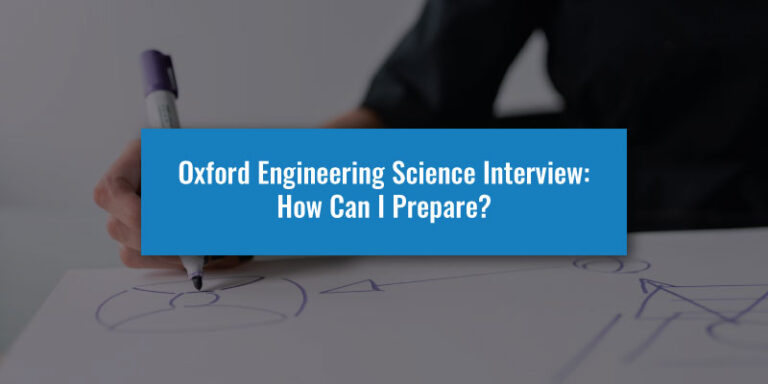When studying Engineering at Oxbridge there is a wide scope for specialisation, with 11 branches offered across the two universities.
With so much choice available to you, how do you choose your Oxbridge Engineering speciality?
What Are The Types Of Oxbridge Engineering Specialities?
At Oxford and Cambridge, students are admitted onto a General Engineering course and when they reach their final year, decide which branch of Engineering they wish to specialise in.
The branches available are:
Early preparation is the key to a successful Oxbridge Engineering application.
Writing the perfect Personal Statement, scoring highly on the ESAT or PAT and interviewing like a pro is how you get your dream Oxbridge Engineering offer. Discover our Engineering Programme for comprehensive admissions support by clicking the button below to enrol and triple your chances of success.
Aerospace and Aerothermal Engineering
Aerospace and Aerothermal Engineering is an interdisciplinary blend of subjects ranging from fluid mechanics, thermodynamics, structures, instrumentation, control, electronics and design to manufacturing. Essentially, Aerospace Engineering is concerned with flight and Aerothermal Engineering with the associated propulsion systems.
In the past, development in these fields has been driven by technological issues. In the future, environmental concerns, minimising noise and pollution, and relentless pressure on design and manufacturing turnaround time will lead to novel solutions.
Cambridge students who wish to pursue this branch of Engineering will have to have a good understanding of fluid mechanics which is essential in both Aerospace and Aerothermal Engineering.
Students taking this have to select four modules to take, with 3A1 and 3A3 compulsory plus two core or companion modules.
Core modules:
| Module Code | Module Title |
|---|---|
3A1 | Fluid Mechanics I (double module) |
3A3 | Fluid Mechanics II (double module) |
3A5 | Thermodynamics and Power Generation |
3A6 | Heat and Mass Transfer |
Companion modules:
| Module Code | Module Title |
|---|---|
3B1 | Radio Frequency Electronics |
3B2 | Integrated Digital Electronics |
3C1 | Materials Processing and Design |
3C5 | Dynamics |
3C6 | Vibration |
3C7 | Mechanics of Solids |
3C9 | Fracture Mechanics of Materials and Structures |
3D3 | Structural Materials and Design |
3D4 | Structural Analysis and Stability |
3D7 | Finite Element Methods |
3F1 | Signals and Systems |
3F2 | Systems and Control |
3M1 | Mathematical Methods |
For those wishing to study Aerospace Engineering at Oxford unfortunately will not be able to do so. This speciality is not offered there and can only be studied at Cambridge.
Bioengineering
Bioengineering is a rapidly growing field encompassing the use of engineering tools to solve problems in medicine and biology as well as new quantitative approaches to biological systems based on engineering principles.
Bioengineering is also the application of engineering principles to living structures such as, creating artificial organs, chemicals, drugs and tissue.
Subsequently, Biomedical Engineering uses concepts and principles for the design, maintain, validate and calibrate all the devices and equipment that we see in hospitals, research and medical centres.
The difference between Bioengineering and Biomedical Engineering is that the latter of the two is an umbrella term which encompasses Biomedical Engineering. It is applied to all life sciences and medicine whilst Biomedical Engineering focuses more on medical and healthcare.
However few adhere to these definitions and in fact the terms are often used interchangeably.
The Cambridge Bioengineering course is split into three key focus areas, these are:
Biological Engineering
Aims to uncover the physical processing underlying such phenomena as tissue deformation, embryo development, cancer cell mobility and blood coagulation, while neuroscience developments aim to develop new approaches to modelling learning.
Biomedical Engineering
Works closely with clinicians to develop solutions for medical imaging, repair of biological tissue, and diagnosis and treatment using biosensors and nanomaterials.
Healthcare Engineering
The intention behind this is to embed a systems engineering culture in the UK Health Service and its suppliers, improving patient safety by becoming a focus of patient safety research in the UK, and developing models of good design practice for healthcare practitioners, providers and suppliers.
Students intending to qualify in this Engineering branch at Cambridge must take six of the modules listed below, and must take at least three modules from 3G1, 3G2, 3G3, 3G4 and 3G5.
| Module Code | Module Title |
|---|---|
3G1 | Introduction to Molecular Bioengineering |
3G2 | Mathematical Physiology |
3G3 | Introduction to Neuroscience |
3G4 | Medical Imaging and 3D Computer Graphics |
3G5 | Biomaterials |
3C1 | Materials Processing and Design |
3C7 | Mechanics of Solids |
3D7 | Finite Element Methods |
3F1 | Signals and Systems |
3F2 | Systems and Control |
3F3 | Statistical Signal Processing |
3F8 | Inference |
Biomedical Engineering is one of the six choices available to Oxford students in their fourth year.
Chemical Engineering
Chemical Engineering focuses on the scientific principles that underpin modern Chemical and Biochemical Engineering. Those who go onto careers in this field help manage resources, protect the environment and control health and safety procedures while developing the process that make the products we depend on.
Furthermore, it is all about changing raw materials into useful products you use every day in a safe and cost-effective way.
The aim of the course is to produce graduates that meet the needs of today’s process industries by providing a thorough understanding of the subject, technical competence, and transferable skills.
Chemical Engineering At Cambridge
Those wishing to take the route of Chemical Engineering at Cambridge, there are two paths available to you.
You will spend your first year studying either Engineering or Natural Science as these routes provide equally good preparation for becoming a chemical engineer and are taken up by a similar number of students.
The entry requirements depend on which of the two paths you are coming from. As well anyone wishing to transfer onto the course will have to sit an assessment.
Anyone coming from Engineering will have to sit a two-part assessment. Section 1 is made up of Mathematics and Physics multiple-choice questions. Section 2 is also multiple-choice and assess Advance Physics. Both sections are 60 minutes and calculators are not allowed.
Those who come from Natural Science will also sit a two-part assessment. Section 1, is made up of multiple-choice questions in Mathematics plus one science – calculators are allowed. Section 2, is comprised of extended multiple-choice questions in Biology, Chemistry or Physics. Both sections are 60 minutes.
Chemical Engineering At Oxford
As for anyone wishing to specialise in Chemical Engineering at Oxford, you will cover topics such as the water-energy-fox nexus, decarbonisation, resource recovery, sustainability and the circular economy, regenerative medicine, synthetic biology and biotechnology, and more.
The Chemical Engineering course at Oxford is different to that in nearly all other UK universities. Graduates end up having a much broader education in general Engineering. This gives them breadth and flexibility, and their all-round skills are very appealing to employers
Civil Engineering
Civil Engineering is everything you see that has been built around us. It is about roads and railways, schools, offices, hospitals, water and power supply, and much more.
The kinds of things we take for granted but would find life very hard to live without.
Civil Engineering At Cambridge
Intending Civil, Structural or Environmental Engineers at Cambridge are advised by the university to study the broadest possible range of relevant courses.
These courses include: Foundation and Construction Engineering, Concrete Structures, Pre-stressed Concrete, Structural Steelwork, Architectural Engineering, Plate and Shell Structures, Sustainable Water Engineering, Sustainable Energy, Advanced Building Physics, Construction Management and many others. This Engineering area has many shared modules with Energy, Sustainability and the Environment Engineering Area.
To qualify in this area of Engineering, students must select at least six of the modules given below:
| Module Code | Module Title |
|---|---|
3D1 | Geotechnical Engineering I |
3D2 | Geotechnical Engineering II |
3D3 | Structural Materials and Design |
3D4 | Structural Analysis and Stability |
3D5 | Water Engineering |
3D7 | Finite Element Methods |
3D8 | Environmental Geotechnics |
3C7 | Mechanics of Solids |
3C9 | Fracture Mechanics of Materials and Structures |
Civil Engineering At Oxford
At Oxford, the Civil and Offshore Engineering Research Group is an established grouping of academics, post-doctoral researchers, graduate students and visitors, together with technical and administrative support staff.
The Group engages in research across a wide spectrum of areas in geotechnics, environmental fluid mechanics and structures.
Unlike Civil Engineering departments at many other universities, Oxford operates without boundaries between the subdisciplines. Therefore, people can foster collaborations across a broad range of research areas in Civil Engineering.
Electrical Engineering
Electrical Engineering concerns the study, design, and application of equipment, devices, and systems that use electricity, electronics and electromagnetism.
The aim is the pursuit of fundamental electrical, electronic and photonics research at the material, device and system levels with a focus on creating integrated solutions in the field of nanotechnology, sensing, energy generation, energy conversion, displays and communications.
Electrical Engineering At Cambridge
At Cambridge there are two different paths to take to qualify in Electrical Engineering. These are Electrical and Electronic Engineering, and Electrical and Information Sciences.
Electrical and Electronic Engineering covers the range of topics that best represents the current trends in circuits, devices, and systems for hardware implementations.
Electrical and Information Sciences covers a very broad area. Some of the modules cover a wide range of electronic circuits and devices, whilst others cover the digital representation and processing of signals and the manipulation of data in computers.
Electrical Engineering At Oxford
Students at Oxford can also opt to take Electrical Engineering when they reach their fourth year.
Taking the Electrical Engineering path allows students to get to grips with the discipline but undertaking a design project.
Previous projects include Electric and Hybrid Formula Student Race Cars based around the Formula Student competition.
Other projects completed by students include a semi-autonomous wheelchair providing assistance for patients suffering from tremor based conditions. As well, another project which developed ways to provide older people with a safe and comfortable home environment, including energy, communications and monitoring.
Early preparation is the key to a successful Oxbridge Engineering application.
Writing the perfect Personal Statement, scoring highly on the ESAT or PAT and interviewing like a pro is how you get your dream Oxbridge Engineering offer.
Discover our Engineering Programme for comprehensive admissions support by clicking the button below to enrol and triple your chances of success.
Engineering Mathematics
Only offered at Oxford, Engineering Mathematics is the art of applying maths to complex real-world problems; combining mathematical theory, practical engineering and scientific computing to address today’s technological challenges.
Mathematical modelling is the key technical skill of an engineering mathematician. Problem-solving of this kind is best learnt hands-on using case-study applications spanning engineering, the life sciences, medicine, climate science, energy, data science, robotics and more.
As well as technical abilities, you will gain a wealth of professional skills that are highly valued by employers.
Problem solving – demonstrating patience, persistence and an innovative approach.
Team working – experiencing different roles in group work gives an insight into project management; how to deliver complex projects to tight deadlines, identifying and mitigating risk to arrive at the best solution.
Communication – you’ll learn to write reports, give presentations and create posters, webpages, wikis and more, so you can get your message across coherently and clearly to any audience.
Multidisciplinarity – stand out from the field with an understanding of both Engineering and Mathematics. Being around other Engineering disciplines, you’ll see how theory is put into practice and how it may need to be extended and adapted to meet real demands.
Computing – you’ll learn industry-standard programming languages such as C, C++, Java and Matlab, as well as algorithm design skills so you can pick up new languages quickly and easily. IT skills are vital for problem-solving and help you communicate using both standard and specialist tools, including Microsoft Office and LaTeX.
Energy, Sustainability and the Environment
Power Generation and Environmental Engineering are central to the advancement of a sustainable future in developed and emerging economies.
Energy Engineering and Sustainability are broad interdisciplinary subjects. This Engineering area offers the opportunity to draw together modules across Electrical, Mechanical and Civil Engineering, with application areas ranging from power generation in gas and steam turbine plants, to fuel cells and renewable energy technologies, to buildings and infrastructure.
This Engineering speciality enables students at Cambridge to study the whole power industry and associated technologies (fossil fuel, nuclear and renewable energy).
Students intending to qualify in Energy, Sustainability and the Environment must take at least six of the modules listed below. As well anyone who is planning to take Nuclear Engineering modules in Part IIB should take module 4M16 in IIA.
| Module Code | Module Title |
|---|---|
3A1 | Fluid Mechanics I (double module) |
3A3 | Fluid Mechanics II (double module) |
3A5 | Thermodynamics and Power Generation |
3A6 | Heat and Mass Transfer |
3B4 | Electric Drive Systems |
3D5 | Water Engineering |
3D8 | Environmental Geotechnics |
4M16 | Nuclear Power Engineering |
This speciality is currently not offered at Oxford.
Information engineering
Information Engineering deals with the generation, distribution, analysis, and use of information, data and knowledge in systems. The field first became identifiable in the early 21st century.
Information Engineering At Cambridge
As such at Cambridge it straddles the boundary between traditional Computer Science and Engineering Departments.
The Division is split into four main research Groups.
The Control Group carries out research in the theory and practice of control Engineering with applications including automotive and aerospace control.
The Machine Intelligence Laboratory leads research in the areas of speech recognition systems, computer vision, bio-robotics and medical imaging.
The Signal Processing and Communications Group performs a wide range of signal and image processing projects with diverse application areas.
The Computational and Biological Learning Group uses engineering approaches to understand the brain and to develop artificial learning systems.
Information Engineering At Oxford
First established back in 1985 at Oxford, the Robotics Research Group brought together a group of like-minded engineers working in robotics research and artificial intelligence.
Now known as Information Engineering, it is currently composed of seven research groups whose interests range from machine learning to mobile robotics.
These research groups are:
Instrumentation and Control
Another branch which is only offered at Cambridge, Instrumentation and Control covers a range of topics that are important to the monitoring and control of modern systems.
In the table of modules below, B modules cover basic circuits and device technology and F modules cover the representation, capture and manipulation of signals. The C modules cover the relevant Engineering aspects of mechanical systems.
Students are strongly advised to take both 3F1 and 3F2.
| Module Code | Module Title |
|---|---|
3B1 | Radio Frequency Electronics |
3B2 | Integrated Digital Electronics |
3B5 | Semiconductor Engineering |
3B6 | Photonic Technology |
3C5 | Dynamics |
3C6 | Vibration |
3F1 | Signals and Systems |
3F2 | Systems and Control |
3F3 | Statistical Signal Processing |
3F4 | Data Transmission |
3F7 | Information Theory |
3F8 | Inference |
3G4 | Medical Imaging and 3D Computer Graphics |
3M1 | Mathematical Methods |
Mechanical Engineering
Offered at both Oxford and Cambridge, Mechanical Engineering covers a very broad field.
The main, traditional, areas are mechanics, materials, and design, fluid mechanics, dynamics and thermodynamics, but topics in Control Instrumentation, Electrical Materials, Civils, Energy and Bioengineering are also relevant.
Combinations of course can be found to suit many different career paths – but it would be best to consult a Director of Study before choosing a very eclectic mix of course, in case a lack of overlap makes the workload unusually high.
Production Engineering
Production Engineering is all about products and processes.
Production engineers are responsible for devising exactly how something is going to be made, what machines are going to make it and how it can be made as efficiently and as safely as possible.
As long as there is a production line and a process in place, you will likely find a production engineer close by.
If you feel this is the sort of Engineering you are interested in, this is only available at Oxford out of the two universities.
Still Unsure?
There is no reason to worry if you are still unsure which Engineering area suits you best, even by the end of your third year!
You can simply choose your favourite modules and qualify for “general” Engineering. The University of Cambridge has decided to deprive its students from the pressure of having to choose a specific Engineering area, while allowing them to be highly employable with a broadly based degree.
Aiming for a career in Engineering after you graduate? We’ll help you secure your dream Engineering offer first.
Applying to Oxbridge is immensely competitive, and you must give yourself the best chance of success. We help you craft the perfect Personal Statement, achieve a highly competitive Admissions Test score and teach you how to Interview effectively – covering all areas of your Oxbridge application.
Discover our Oxbridge Engineering Premium Programme.







